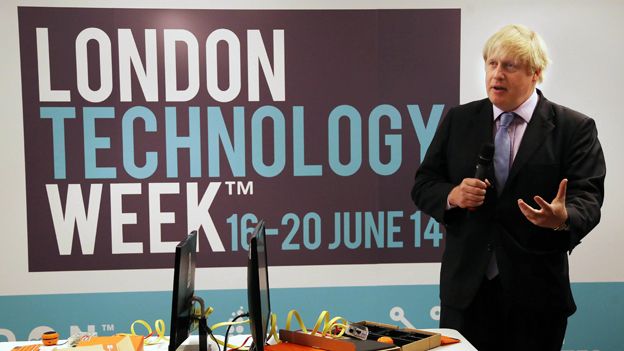California dreaming: London's hi-tech aspirations
- Published
- comments

London is blowing its tech trumpet in a big way this week.
Boris Johnson, along with former New York mayor Michael Bloomberg and the venture capitalist Sir Michael Moritz, have just launched London Technology Week - a series of events designed to boost the reputation of the capital as a technology cluster. And if you were to believe some startling research commissioned for the week, London is already hitting it out of the park.
A report by Oxford Economics claims there are 34,000 tech businesses in London now, and in the next decade there will be another 11,000, creating 46,000 new jobs. (The fact that TechCity only released one page of the whole report makes it difficult to assess this claim).
Another report by two academics makes an even more startling claim - that there are now more technology and information workers in London and South East England than in the whole of California. So relax everybody, we've got Silicon Valley on the run.
Well, not quite. Some caution needs to be applied, first of all as to what constitutes a technology business or worker. There is some suspicion that all kinds of marketing and PR jobs are being included, and when you ask for examples of really hi-tech businesses in London they are thin on the ground.
Then when you look for London start-ups that have made it big as independent businesses there is still not much to crow about. The biggest UK success story of recent years has been ARM, the microprocessor designer, but it was born and grew up in Cambridge, not London. Asos and Betfair were the two names bandied about at the Technology Week launch, but both were founded long before the whole TechCity project got underway.
When I put it to Boris Johnson that he as a classical scholar might sense a degree of hubris about the claims, he agrees that this is a danger: "There is no reason for hubris when you consider that… we haven't yet produced the kind of knockout multi-billion pound businesses that we see in Silicon Valley." He muses on why that might be the case - is there a British diffidence about making money, is the venture capital industry not as imaginative as it might be?
There is of course one very imaginative venture capitalist at the event, Sequoia's Sir Michael Moritz. Born in Wales, then a journalist in the US, he spotted the potential of Google and Yahoo at an early stage, and so became one of Silicon Valley's wealthiest venture capitalists.
I've always wondered whether London could prosper without better links between TechCity and local universities, but Sir Michael thinks the answer lies in looking at a wider area: "London is beautifully situated, with Oxford and Cambridge being an astonishingly fertile triangle of scientific, engineering and mathematical knowledge," he says. He feels there are also grounds for optimism in the willingness of young people here to take the risk of starting their own business, something that had not been the case when he left the UK.
It does seem to be the case that some technology companies are being started in Oxford or Cambridge, and then moving to London for higher profile and better access to capital - one example is Swiftkey, which uses machine learning to make typing on a mobile easier. But there is still a funding gap - seed finance is plentiful, but there is a scarcity of cash for firms wanting to move to the next stage.
Sir Michael insists that Silicon Valley investors like him will always find a way to detect talent - "people like us are only an email away" - but so far Sequoia has not backed a London tech firm. Sitting alongside him as we speak, is someone he has backed - Sebastian Siemiatkowski of the Swedish payments firm Klarna.
I'd met Mr Siemiatkowski a few weeks ago and been very impressed with technology that makes it far simpler to pay for goods online. Klarna is already taking on PayPal in its home market in Sweden, has a big presence in Germany, and arrives in the UK next month.
He politely joins in with the acclaim for London - he is after all investing a large amount to bring Klarna here - but then explains why his home town Stockholm has been so successful. He says it is all about public investment in infrastructure dating back to the early 1990s, first giving free PCs to poorer households, then providing fast broadband.
He has this advice for London: "I think there's now an opportunity for some tech hub - wherever that might be - to do something really crazy, which is to provide wifi internet access, 3G access for free in the whole country." The first one to do that, he said, would really drive innovation.
There are certainly reasons to be cheerful about London as a technology superstar, and the mere fact that there is so much hype about what are right now quite slender achievements, is helping to draw successful companies like Sweden's Klarna and Cambridge's Swiftkey to the capital.
But consider this when you hear that London is growing faster than Silicon Valley. Last week, one relatively young San Francisco start-up, Uber, received $1.2bn of new funding - that's about £700m. The British Venture Capital Association tells me that in 2012 - the most recent year for which they have figures - £681m was invested in the whole UK technology sector.
So London's tech scene may be growing fast, but it will need a lot more cash if it is to catch up with California.